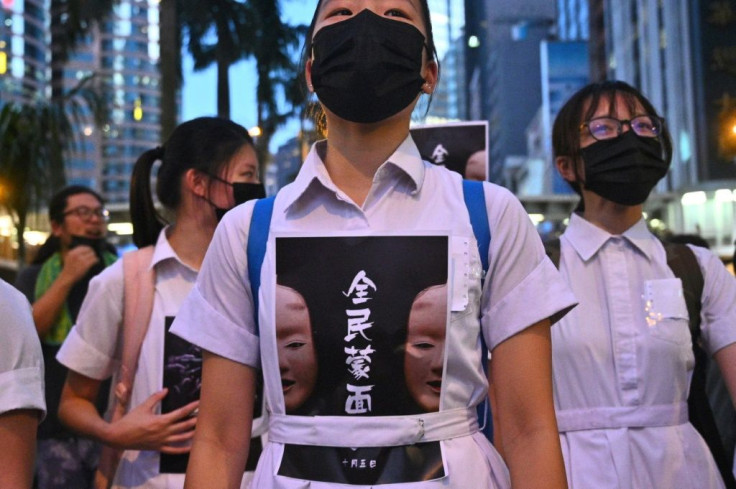Students Join Hong Kong Protests, And Teachers Face The Heat

Teachers in Hong Kong are facing some pressure as a result of students deciding to join the pro-democracy movement that has rocked the former British colony for five months.
At the elite Shatin Tsung Tsin Secondary School on Tuesday, about 100 students lined up around a basketball court and sang Glory to Hong Kong, the recently composed anthem of the protest movement. Some students even waved an American flag, the South China Morning Post reported.
Many other Hong Kong secondary schools (grades 9 to 12) have engaged in protests. In addition to singing the protest anthem, some of the young students are wearing helmets, goggles and gas masks to show their disdain for the recently imposed mask ban aimed at protesters trying to hide their identity.
Kwan Chin-ki, a secondary liberal studies teacher for over 10 years described the “tight-rope” that teachers face from concerned parents to educational authorities. “We have to be particularly careful,” he told the Post. “Expressing our personal political opinions in school is inappropriate because students may listen to teachers and follow their teachers’ positions blindly.”
He added that when curious students ask about his personal views, he advises them to gather information from various sources about the unrest instead of sharing his opinions.
Some of the criticism is coming from those loyal to Beijing naming the teachers as the culprits by bringing politics into the classroom. Harsher criticism has come from Chinese state news agency Xinhua who raised the question, “What happened to Hong Kong’s education?” in a recent commentary.
The news outlet lambasted Tsuen Wan Public Ho Chuen Yiu Memorial College, which promised not to expel Form Five student Tsang Chi-kin, 18, who was shot in the chest on Oct. 1 after a group of protesters attacked police in Tsuen Wan.
Xinhua criticized the school for focusing on the concerns of students instead of the crimes of 18-year-old Tsang Chi-kin who was charged with rioting and two counts of assaulting police officers.
Another view was voiced by Wong Kwan-yu, president of the pro-Beijing Hong Kong Federation of Education Workers (HKFEW) who said, “If students have questions or concerns, they should communicate with teachers to find solutions. Schools are not places for people to express their political demands.” He blamed inadequate school management for failing to protect students from external influence.
Other critics point to peer pressure that teenage students may be subjected to. Wong Kam-leung, a board member of one secondary school in Tung Chung says: “Secondary students are aged between 12 and 18 and have immature minds. They can easily get emotional, or even impulsive, during activities that involve chanting slogans and singing songs.”
© Copyright IBTimes 2025. All rights reserved.




















